#im so fucking normal about this man
Explore tagged Tumblr posts
Text

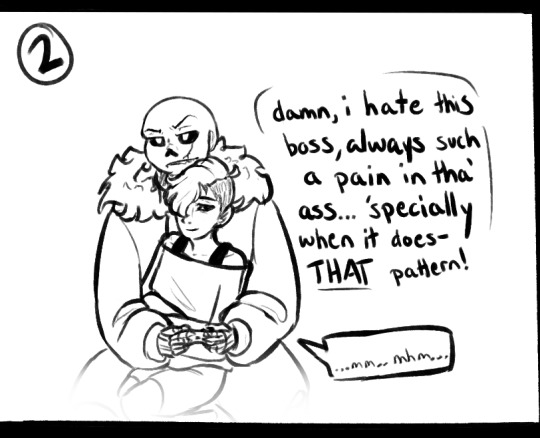
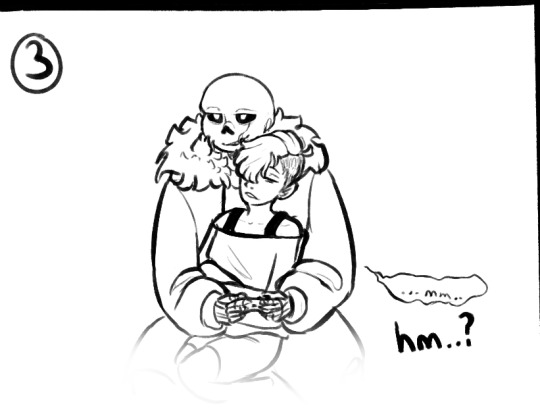


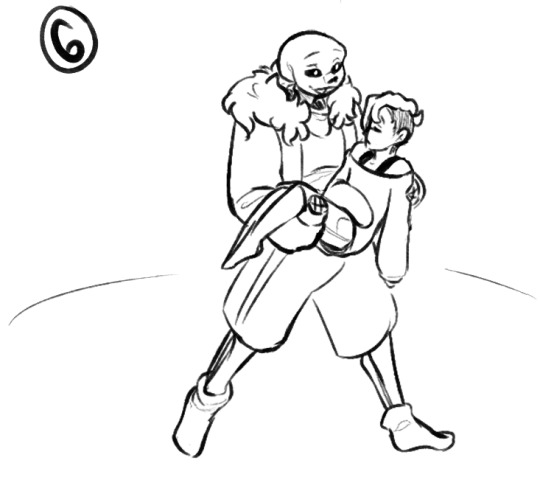
im not simping YOURE simping
#my art#fell sans my beloved#mono's simping again#mono's simping so fucking hard#i just. hhhhh imagine cuddling up to him#and he just keeps rambling as he plays#and i fall asleep to the sound of hims voice#and then him goes to tuck me into bed#im so fucking normal about this man#okay now the pics are reuploaded individually instead of one big one
92 notes
·
View notes
Text

patron saint of never growing old
#i think theres something uniquely tragic about how we never know what tessa looked like when she was alive#and that the only reason we have an idea of her appearance is via cyn wearing her skin#i interpret the humans being depicted as glitchy silhouettes to be very literal; the MDs barely remember what they look like#due to their memories being fucked with so frequently. and that makes the cynessa reveal a lot worse imo#to see something- someone- that you once remembered to be warm and familiar contorted into something unrecognizable and dangerous#and being unable to remember what she looked like before being puppeted by a monster#you try to imagine her face- young bright and happy- but can only visualize her dead skin stretching unnaturally across robotic features#belonging to the source of all your suffering and trauma.#guh. she was just a kid. man#never got to grow up. never got to get away from her shitty parents. never got to live before she died. whatever. im normal#murder drones#murder drones fanart#murder drones tessa#tessa james elliot#tessa elliot#tessa murder drones#md tessa#gloom.art
1K notes
·
View notes
Text
ok. hi epic the musical community. how we feeling after the vengeance saga? cuz me personally

#man.#that shit was so fucking cool im sCREAMING#i dont think i can be normal about this one#trust im gonna make the longest yap about this. just. tomorrow. its 12 am and im tweaking out#epic the musical#epic the vengeance saga#epic musical
827 notes
·
View notes
Text
he says i hate everyone except you and that is addictive and that is kind of romantic and beautiful because you're young and you're kind of a sarcastic asshole too and you don't like bad boys, per say, but you don't really like good ones either. and you like that you were the exception, it felt like winning.
except life is not a romance book, and he was kind of being honest. he doesn't learn to be nice to your friends. he only tolerates your family. you have to beg him to come with you to birthday parties, he complains the whole time. you want to go on a date but - people are often there, wherever you're going. he's just so angry. about everything, is the thing. in the romance book, doesn't he eventually soften? can't you teach him, through your own sense of whimsy and comfort?
at first - you know introverts often need smaller friend groups, and honestly, you're fine staying at home too. you like the small, tidy life you occupy. you're not going to punish him for his personality type.
except: he really does hate everyone but you. which means he doesn't get along with his therapist. which means he has no one to talk to except for you. which means you take care of him constantly, since he otherwise has no one. which means you sometimes have to apologize for him. which means he keeps you home from seeing your friends because he hates them. you're the single exception.
about a decade from this experience, you'll type into google: how to know if a relationship is codependent.
he wraps an arm around you. i hate everyone except you. these days, you're learning what he's actually confessing is i have very little practice being kind.
#i used to think it was romantic too and then i was like. now i see it as a HUGE red flag#writeblr#it is also almost EXCLUSIVELY said by immature ppl who think this is normal#fyi even if u think it's funny and ur like 'im an introvert it's just TRUE' like. you need therapy (ily tho)#healed introversion is just ''i would prefer to be by myself'' not ''i hate every person'' ... hate is not normal. that is not healthy#im sorry. i know it feels accurate. but if you're walking around with that kind of rage....#1. you're making a LOT of assumptions about every single person u have ever met. which is often unfair and unkind#and also usually involves judging people based on their worst moments or little mistakes#2. you are being unfair to the person who is ur ''exception''#3. there is a VAST difference between ''ur my favorite person'' and ''the ONLY person i like.''#idk i think this is just a personal bias thing tbh#im sure there are people who have this experience normally#but i have YET to find a man who thinks like this and ISNT absolute DOGSHIT. although tbh.... like. im sure he exists#when u hit like 30 some of the things that were once kind of hot now just sound fucking exhausting. like ''im in a band''#edit in the tags: i used to kind of be like this too. but the thing is that like. my life became so much more peaceful#once i started believing that people are generally good. like yes i am mad at the world at large#but it's just.... a very hard way to live. you're not a bad person or wrong for the ways other people hurt you and taught you to be angry.#but that anger will continue to hurt YOU. it will punish YOU. it will prevent YOU from making new deep connections. it will protect you yes#but it will also cause MASSIVE blowback. bc if you lose the One Person... your life will fall apart. i know this personally.#i really recommend just trying to be... cautiously optimistic instead. like. yes#people can be horrible and cruel and there are some communities (incels for example) that aren't worth that optimism#but i think like... most people will hold a door for you . most people want to help you find your wallet .#i hope one day you are able to find peace. i hope that rage eventually smooths over. i know how hard it is PERSONALLY#and i know what must have happened to you. and im deeply deeply sorry we share the same wound.#but i promise - sometimes we all need someone else to help us carry the weight. eventually the rage has to die so that we can let help in#i had to spend years biting at outstretched hands. i still often do. im still very wary . and my heart breaks that you flinch too.#here's the thing: i don't blame you. but we were both acting out of fear and pain. .... not out of healthy behavior. and ... change#was needed. i needed change too. rage was useful for a while. then it just left me isolated and bitter. i had to (with effort)#choose to let that rage go. and let people in . VERY SLOWLY THO LOL
5K notes
·
View notes
Text
Ideology of Exceptionalism and Gravity Falls; meta and character analysis

I had a whole ago read a post by @icanlife that had a quote by Alex Hirsch on Ford's greatest flaw, and wanted to explore what the flaw is, which is the ideology of exceptionalism; in the exploration, I’ll touch on what it is and how it is used in abusive relationships and cults, as well as how it drives multiple Gravity Falls characters and consequently how it impacts relationships between these characters, and how the show ultimately refutes exceptionalism.
Quick note here; I am not in any way, shape or form a psychologist nor have any formal training in psychology; this is written from my own experiences with this ideology and my own forays into psychology and trauma-informed learning. It is also written with a loose understanding that is likely not broad enough to cover all references to cults, extremist groups and abusive relationships.
The Ideology of Exceptionalism
First of all, we have to get through a drier bit, which is… what is the ideology of exceptionalism and how does it arise? Might be fairly obvious, but it is the belief that you are, or belong to, a group of exceptional people, thus more important and worth more than anyone else; ie, those who don't qualify as 'exceptional'. It is often a subconsciously learned ideology. Now, what qualifies one as exceptional can be extremely varied; generally it revolves around something that provides some form of privilege. Thus, it might be, as the main exceptionalist idea in Gravity Falls, 'intelligence', or power, or it can be such things as attractiveness, quantity of money one has, species, nationality, or skin colour and ancestral heritage. The ideology of exceptionalism, being by nature hierarchical, devalues, and at its worst, openly and violently dehumanizes those who do not qualify as exceptional.
For why exceptionalism occurs is an extremely broad topic, but I've personally found that, for exceptionalism revolving around intelligence, it's a result of a poor sense of self-worth, and having one's self-worth tied to what makes one exceptional. Poor self-worth itself (again, broadly) is a result of childhood trauma from a lack of positive affirmation and unfulfillment of the emotional needs of the child. Meanwhile, self-worth becoming tied to the quality of exceptionalism generally is a result of when positive affirmation was pretty much solely provided around their 'exceptionalism', especially when provided derogatory commentary, or a blatant example of how they would be treated if they aren't 'exceptional'. As a result of the general lack of affirmation, self-worth then becomes often solely reliant on the qualities of exceptionalism, as that is the only way for the child (and later, adult) to get affirmation of their worth, as well as out of fear of being ‘not worth anything’ like the examples of ‘non-exceptional’ people they have been given.
This is especially likely to occur when the child is a social outcast; the adoption of the hierarchical ideology of exceptionalism, and the devaluation/dehumanization of others often occurs subconsciously as an avoidance/minimization tactic from pain. This is to say, the child, and later the adult (if healthy self-worth is not established) goes 'it doesn't matter what the non-exceptional people say or if they accept me since I matter more than them because of my exceptionality'. It can even be taken further, that being shunned is part of one's exceptionalism, and becomes part of the qualifier of being exceptional. For instance, 'they just can't understand because they aren't exceptional and that's just a part of being exceptional'. This idea also neatly tailors into the part of the concept of being better then others means you are separate from others; this can be taken that someone who is special, needs to be alone to be truly special.
Obviously, exceptionalism is not a healthy coping mechanism for poor self-worth, as often such people constantly feel the need to prove and show off their exceptionalism to gain that affirmation and avoid rejection, which is stressful. As well, it often negatively impacts their relationships with other people as a result of the arrogance of believing that they are better than most others, or even deliberate sabotage due to their arrogance. This occurs as they flatten the complexity of human experience to black-and-white hierarchical categories of exceptional/not-exceptional through constant judgement of those they meet, and often refuse to engage with people who don't belong to their 'exceptionality', or even people they simply don't like, even if they technically qualify. Generally, those that they do like or have close relationships with, often due to being similar, are automatically labelled as 'exceptional'. Those judged as ‘exceptional’ also become privy to the open judgements of ‘non-exceptional’ others, out of a subconscious belief by the exceptionalist that the other believes similarly; something that may strain their relationship if the other doesn’t ascribe to exceptionalism. This all culminates in the exceptionalist being blind or even adverse to the diversity of experiences, which makes it difficult to create relationships and community outside of echo chambers of their own beliefs (if they can even find this), and subsequently, these people are often isolated and have very few to no close relationships with people.
However, all humans require connections with other people, relationships where one can rely on others emotionally and physically if needed and feel accepted; they also require to feel like they are worth something, that their life has meaning. Lacking meaningful connections and having a crippled sense of self-worth, a deep yearning hole is left in these people. Exceptionalism, especially as it is a narrative constantly pushed by Western society as it validates hierarchies, is then employed as a (often subconscious) trauma response to assuage this yearning hole, with arrogance and denial. And depending on the circumstances, it can be a very strong and definitive trauma response for people.
This isolation and lack of self-worth is catnip to abusive relationships, including cults and extremist groups. These types of relationships often heavily rely on isolating their victims or pulling them into echo chambers of solely the abuser’s rhetoric, to redefine what is healthy through gaslighting; as the exceptionalists are already isolated, this makes them extremely susceptible. They also often provide these people affirmation, and in these cases especially about their exceptionalism, thus confirming their self-worth, their 'specialness', while also providing them the connection they have been lacking, either through the cult community or through the abuser’s own presence. These emotional needs, which haven’t been met in a long time, if ever, begin to be fulfilled; something that abusive relationships and cults hinge on, rather than any form of logic.
Ideology of Exceptionalism and Gravity Falls
The main characters within Gravity Falls which are heavily ascribed to exceptionalism would be both Ford and Bill; this characterization deeply impacts the story and their relationships with others (technically the Northwest are another case regarding wealth, but less directly impact the storyline and thus tangential; Gideon also is an example, but as a mirror of Bill). With each of these characters I’ll go into detail within their sections on the way they began to ascribe to exceptionalism, and how it plays out later in their relationships; I will first begin with Ford, then move to Bill. Then, to cap it off, I’ll go into the characterization of Stan and the way Gravity Falls refutes exceptionalism.
Ford and Exceptionalism
Firstly, the quote from Alex Hirsch that kicked this whole baby off, as mentioned previously;
“Ford sees Dipper as someone who’s special like himself. That’s Ford’s great flaw, his arrogance is he believes that there’s special people, and everyone else. That human attachments are actually weaknesses. And the song and dance that he’s giving Dipper right now, is the song and dance that he gave McGucket, back when they were younger… ‘You and me are different, we’re better than everyone else. We have a path that no one else can understand, and only us can do this.’ It’s a very seductive idea for Dipper… Dipper is a smart kid, but Ford’s projecting. Ford loves Dipper because he sees someone who’ll tell him ‘yes’ to everything. Who’ll never challenge him, who’ll do a really insane dangerous mission.”
Very blatantly Alex Hirsch calls Ford out on his arrogance in the belief that he is special, in his belief in the 'lone hero' complex, in his belief in exceptionalism. And really, it should be no surprise that Ford does so, considering the way he's depicted as a social outcast as a child (other than Stan), and the way his parents have been clearly shown to be not particularly emotionally supportive (��I’m not impressed”); they don't provide positive affirmation except for his intelligence (mostly due to the possibility of money making through it…), while also actively comparing him to Stan who is derogatorily ‘not-exceptional’, and ‘worth less’. This all sets Ford’s self-worth up to be fragile, and other than Stan who wholeheartedly accepts him, he is isolated and invalidated; plus, the only other validation he receives is around his intelligence. All very classically fitting the profile for exceptionalism.

Image id: Stand and Ford when they were children, both clearly enjoying each other's company.
Ford’s belief in his exceptionalism catalyzes after the shattering of his and Stan’s relationship. Previously the twins are shown to do everything together, having a very close caring relationship; something unlikely if Ford thought he was better than Stan. Also, when Ford is talked to about his opportunities, Ford looks uncomfortable at the way they talk about Stan as inferior, compared to how he himself is being praised; but in the offer he’s simultaneously finally being validated, he’s being told he’s someone worth something, and he’s going to be someone worth something after this. And then the science fair incident occurs, and Ford loses that validation from his parents, from the judges and a future of more validation; after being promised validation and acceptance, it slips through his fingers. And in his anger of being denied that, it becomes easy to begin to slip subconsciously into the rhetoric the others have been feeding him; that he’s exceptional, that Stan isn’t, and he deserved to be recognized for his worth. So he breaks the relationship with the only person who accepted and validated him for who he is. With that loss of previous support, Ford becomes then deeply obsessed with proving his exceptionalism to the world to assuage that fragile self-worth, to become accepted, or even better, revered, confirming that he is someone of worth, someone special, like he was promised.
Ford’s obsession also doubly functions as a way to alleviate his guilt over shattering their relationship; if he’s exceptional as he believes, then he’s within the right to respond the way he did, as he’s worth more than Stan, he's better off alone, and he has a right to be angry over being denied that validation. As well, in much the same way as it is used as a way to alleviate his guilt over the end of their relationship, it is also likely used in a way to minimize the pain of being ostracized (although not directly depicted); afterall, Ford’s keenly aware and insecure about his social ineptitude and his six fingers as things that make him different from other people, case in point with his experience visiting Lazy Susans Diner. Thus it wouldn’t be unsurprising if he uses the idea of being worth more than those who ostracize him to imply it ‘doesn’t matter’ what they think. His ostracization by nature keeps him from generally forming close relationships, with the exception of Fiddleford (who much like him, is socially outcast, and intelligent) during his university days. As a result, he's isolated and acutely lonely, having lost Stan.

Image id: One of the missing Journal 3 pages in TBOB, detailing Ford's botched social interaction in Lazy Susans Diner. In the background is the print of his six-fingered hand.
In his obsession over being acknowledged, Ford, like many others who believe in exceptionalism, identifies strongly with the causes of his ostracization (his intelligence, his six-fingeredness) as part of, or wholly, makes him exceptional. It is obvious through his choice of study; with the grant he has been gifted, he chooses to revolve his work around the weird, the outcast, something that you see Ford gravitate towards being an outcast and deemed 'weird' himself (which in Journal 3 he openly talks about). Something that can be, much like him, framed as 'exceptional'. His work is even recorded in a journal that Ford deliberately chooses to put his six-fingered hand on the cover of. Intertwined with the way it becomes adopted into the idea of exceptionalism, is the keen loneliness from his ostracization and a deep desire to be accepted and a wish to find a community of other weird people.

Image id: Two pages from journal 3, labelled 'Myself', in which Ford is open about being weird, and a social outcast, while also noting his ambitions and that 'Gravity Falls, [is] the place that I fit in.'
Ford and Bill
All of this culminates in Ford becoming an incredibly easy target to manipulate by Bill. He’s desperate to be acknowledged (and thus accepted) by an authority figure so that his belief in exceptionalism is justified and his self-worth confirmed. And he knows he’s intelligent, that he's exceptional because people have told him so, but he just needs to prove it with something that shakes the world. And the grant is finally his second chance after the fair, but he's stuck, and the research is going nowhere, and he's in a town where he doesn't really know anyone and he’s so terribly lonely. And sure, he clings to his exceptionalism but if he can't even prove it then is he really exceptional? Is he even worth anything like he thought he was? And what about what he's left behind, rejected, because of his exceptionalism?
And THEN he finds an incantation and he ignores the warnings because maybe, just maybe, this will be his break to get that acceptance/validation he has been chasing his whole life?
And then it's better than that.
A god, essentially, shows himself to him, an ultimate figure of authority. And he tells him that yes, he is special, he’s worth more than other people, and Bill’s only showing himself to Ford because he is so much more intelligent than anyone else. Ford is suddenly getting his exceptionalism confirmed by a god of ancient knowledge, an immensely intelligent interdimensional being, and he’s also showering him with affirmations, specifically affirmations around what Ford's fragile self-worth is based on. And even better, he's delighted by Ford's six-fingeredness; he's not put off at all, it even becomes his main nickname for Ford, just like it used to be for Stan all those years ago. On top of it all, Ford's own social ineptitude doesn't phase Bill, another thing Ford is self-conscious about; Bill's own social ineptitude as he's not human probably makes Ford feel comfortable, knowing that's not expected from him.
Through Bill, not only does Ford find someone who validates his self-worth through intelligence and even confirms to him that his weirdness is part and parcel of making him special, he also finds someone who he regularly (generally) is in contact with, who enjoys talking to him and even banters with him familiarly. Hell, Bill even deliberately goes out of his way (literally possessing a whole wack ton of rats, then dream karaoke) to celebrate his birthday with him; how long do you think Ford has simply skipped his birthday since he had no one to really celebrate it with? The loneliness, beneath his arrogance and belief in exceptionalism, is being fulfilled; for the first time since Ford was a teenager, he's fully accepted by someone, social awkwardness, six fingers, exceptionalism and all.

Image id: One of the lost pages from Journal 3 in TBOB, the 'one thing led to another' page, with Bill and Ford singing karaoke and drinking together, both clearly enjoying themselves; Bill has an arm slung around Ford's shoulders.
So it's really no surprise at all that Ford fell for this, hook line and sinker. Hell, if I was in Ford's shoes I would fall for it just as hard. And I've seen a few posts floating around talking about how Bill is bad at manipulating, and no, he's not. He was able to pinpoint exactly what Ford wanted and needed, and provided that, was charismatic enough to provide that. Again, manipulation isn't about logic. It really isn't; it's about the emotional core in people, what people lack and what you can give them to slowly reel them in to sing your dance and song. And people will ignore vast swaths of red flags when you're finally being accepted, when you're finally getting your emotional needs met at least in some way or form. It's better than not having them met at all, such as previously. So Ford worshipping Bill is really not a surprise, especially as Bill deliberately stoked it.
All of this is part of why you see Alex Hirsch call Ford's belief in his exceptionalism his greatest flaw; because it allowed him to be very easily manipulated by Bill, and by its nature kept Ford isolated from others, evident by his arrogance in assuming he knows best and refusing to see other people who aren't as 'intelligent/weird' as him as worth getting to know, listen too and even reach out to ask help from, it's him believing he has to be the lone hero as someone whose 'special'. It's something that blinds him to the danger of his work around the weirdness of gravity falls because he’s desperate to seek a place where he and his weirdness belong, and it's something that plays out in each and every relationship he has because it's something he clings to so deeply. It's what cost him his relationship with Stan, who previously accepted him completely, and, as he's disinclined to form new relationships and as Bill actively strokes his paranoia (Trust No One…), ultimately further increases the hold Bill has over him. It's only Fiddleford’s presence as he works with Ford that allows him some form of outside reference and reprieve from solely Bill’s influence, something that Bill resents deeply and is clearly jealous and angry about, even if Fiddleford is helping create the portal. And it's ultimately Fiddleford, once he was aware enough of what was happening, calls Ford out on it, seriously jeopardizing Bill's influence over Ford; but Ford is too invested in the portal, in chasing his own ambition and caught up in Bill’s manipulation to take him seriously, until the incident with the trial, and Ford beginning to hear other voices then Bill.
Ford’s Exceptionalism and Wider Relationships
Now back to how it plays out in all Ford's relationships; we've already gone over it with Bill's influence, because it made him extremely easy to manipulate, and with his disregard of Stan in favor of validation of his exceptionalism. But Ford, as pointed out by Alex Hirsch, also exerts the ideology's seductive rhetoric to both Fiddleford and Dipper (who look up to Ford) in a similar way that Bill does with him (although there is a difference of it being used intentionally and maliciously, compared to subconsciously and earnestly, even if it is problematic). Ford, with his black-and-white view of exceptionalism, sees both Fiddleford and Dipper as people who are like him; 'exceptional', and so he treats them as such, and uses this rhetoric to coerce them into helping him.
For Fiddleford, the lure is how he can change the world, how he can be finally acknowledged if he helps Ford with the portal. And it works well; he willingly chooses to leave his own work and his wife and young son, to work with Ford. Much like Ford, Fiddleford himself is also a social outcast and regularly presumed less smart than he is, and he’s got a chip on his shoulder to prove himself, to gain acknowledgement and recognition from the world at large. Although Fiddleford has a family which presumes he’s not entirely lonely like Ford is, he also clearly has deep feelings for Ford, some which are hinted to be more than just ‘friendly’ feelings; it is likely the combination of the lure of validation and spending time with Ford, a kindred spirit that accepts him and an old friend/crush, that causes him to agree (afterall, it was Ford who made Fiddleford feel accepted and choose to stay at Backupsmore). And Fiddleford’s not even considered a partner, but rather an assistant to Ford due to Ford's arrogance, and he still drops everything to go! It’s more about their relationship and connection rather than validation, but that doesn’t stop Ford from espousing exceptionalism. And this is a distinguishing difference, because although Fiddleford would like recognition, he’s not there solely because of it; he’s not a believer in exceptionalism nor arrogant about his skills, and so, unlike Ford who is blinded by his obsession, he’s much more aware of the dangers of the weirdness of Gravity Falls. Thus, he's actively calculating the risks involved, and when he realizes there could be potentially devastating consequences of the portal, he attempts to talk Ford out of it; this fails due to Ford’s own denial and obsession over the portal. In the end, it all goes terribly sideways, and Fiddleford ends up losing everything he had; his wife, his son, his friend, his memories and himself to the trauma he had experienced at the invitation of his friend with the lure of validation and company, due to the memory gun he had created himself.
As for Dipper, much like Ford, he also has issues with self-worth (many of the episodes deal with Dipper finding self-worth; ie, the manotaur episode), has a physical oddity (his birthmark) and by far the trait he relies on most for worth is his intelligence (for example, in one episode he rubs it into Mabel's face over and over again in beating her in games). He's also extremely desperate to be recognized by authority figures as someone intelligent, case in point when he summons the dead after being made fun of by the government agents to try and show them that the information he's gathered is important after Stan dismisses his knowledge. This desperation to be seen as someone of worth from Dipper, much like Ford, extends to the need to be a hero, something he even says at the end of the zombie episode; yet, due to Mabel, unlike Ford he's not a lone hero, and Mabel also half the time acts as the hero.

Image id: Zombies crawling out of a crack after Dipper summons them; Dipper and the two agents look on in horror.
It all culminates in Dipper hero-worshipping Ford when he returns; really, no different than Ford worshipping Bill. And Ford clearly finds it extremely flattering; Dipper's attention and amazement of him feeds his exceptionalism. Exactly how Ford responded to Bill, Dipper is willing to do anything for Ford, excited too, in an attempt to impress Ford and be validated and accepted. And for Ford, that's an extremely heady feeling, especially as someone who has been constantly alone the last 30 years, especially when he had one previously confirm his exceptionalism all those years ago and stopped, and now someone is once again affirming that idea. And Ford doesn't have to be alone again, because he's found a kindred spirit in Dipper as his assistant, someone ‘just’ like him, someone who is exceptional. Because he sees himself in Dipper, he begins to espouse exceptionalism unconsciously, by praising Dipper's own intellect and adventurous spirit, assuaging his feeling of self-worth, while also telling him he's more important or better than others because of it.
And it's seductive to Dipper, because he wants to hear those affirmations of his self-worth, especially as he hero-worships him, but Dipper isn't sold on it, because it means leaving Mabel behind, it means believing that he's worth more than Mabel (and also, Stan, and all his friends he’s made in Gravity Falls). It's ultimately because of his relationship with Mabel that he rejects the ideology; he's not isolated the way Ford was with Bill, and he's not willing to break that relationship for that acknowledgement, because his relationships matter more to him.
Bill and Exceptionalism
Now of course, that's only on the Pines; what about Bill?
While it's obvious that Bill uses exceptionalism as a main manipulative tactic, it's not just an ideology he sprouts emptily; it's also an ideology he believes in, just like Ford, although it's less based on intellectual exceptionalism, and more on power and 'weirdness'.
This most distinctly can be seen in Bill's denial about what happened to his home dimension; Bill's belief in his exceptionalism occurs as a pain avoidance tactic from killing his whole dimension. Bill was clearly a social outcast within his dimension due to being able to see 3d; he's not accepted, and not trusted, to the point that there is medical intervention to make him blind. That's a deeply traumatic experience that completely erases one sense of self-worth, where one’s sanity is called into question by your parents on something that is not harmful, that's beautiful and you just want to share with them. It's a deep and clear rejection of who Bill is, and his ability. As a result, out of a desperate bid to be understood and accepted, he ends up trying to show them the stars. And it ends up killing everyone.

Image id: Page of TBOB, on 'The Early Years' which notes that Bill was an oddity for seeing 3d, something that was illegal to speak about. Bill frames it as something that made him 'special' and better than all the others.
Traumatized, and originally rejected by the dimension, he instead weaves an excuse of exceptionalism; that it doesn't matter what he did to them because he's exceptional and he's worth more than all of them because he can see 3d, because he's powerful, so he shouldn't/'doesn't' feel any remorse about it. With such a traumatic result of trying to be accepted by people, he rejects the idea of trying to be accepted for who he really is; instead adopting a facade of a monster that he believes he is (and eventually, becomes).
Even if he clings to the delusion of exceptionalism, and shuns attempts to find true acceptance, he still wants it; and that's where his henchmaniacs fit in, as they're all, as Bill's noted when trying desperately to get Ford to join him, weird; each has something 'wrong' with them, which is why Bill accepted them as his lackeys (although it's not like we know the context around these). It's a surface-level acceptance however, one more predicated on fear than emotional acceptance. He's taken his 'weirdness', much like many do who believe in exceptionalism,as ‘part of what makes him exceptional'.
In the same way that Ford wants to show the world that he's smart and intelligent by building the portal, Bill does so by wreaking havoc and taking over existences as a way to show the world that he's powerful, that he's someone to be reckoned with, that he's not someone to be ignored because he's someone who's worth more than others. If you can't be loved and accepted, then being hated and feared is better than being ignored; acknowledgement at least approaches acceptance, it's validation of some sort of worth. It also functions as deliberate self-sabotage of his morals, by proving that he is the monster that killed his entire dimension; if that's what he is, then that's who he's going to be, because if he wasn’t, then he has to come face to face with his remorse over what he did to his dimension and his whole house of cards around his exceptionalism and not caring collapses. So instead he keeps feeding the delusions the denial, and lies and lies and lies and keeps lying to ignore all of it, to wrap himself in this shroud of exceptionalism and brutality as a way to function. And it somewhat works, because he's mostly deluded himself about it all, even if subconsciously he knows.
And of course, this display of Bill's exceptionalism is what brings Bill to earth, to Gravity Falls, and to manipulating humans. In meddling with earth and humanity, beyond Bill's goal of taking over earth and fleeing his own unravelling dimension, he also enjoys reaping the benefits of being worshiped by humans, who find him awe-inspiring. Their amazement of who he is, and Bill's own posturing and manipulation of people leads to Bill literally forming cults (ie ciphertology) or having apprentices that worship/find him (to varying degree) inspiring; all reinforcing his feelings of exceptionalism.
Of course, Ford numbers among these people; he praises Bill and worships him, as he's played like a fiddle by Bill, because his self-worth and belief in exceptionalism is fucked up in a way that perfectly resonates with Bill’s. Because it's the exact same types of issues around self-worth, around being an outcast, being weird and wrong physically, and yet at the same time gifted. And Ford clearly is incredibly lonely and yearning for acceptance, but so is Bill; since the beginning he's been trying to find someone who would accept him, even if he's given up on it. And for his song and dance to entice Ford in, he pretends he's not crushed dimensions for fun, that he's not a 'monster'; a version of him he buried after he had tried to show his parents the stars, one that he occasionally resurrects and puppets around for manipulation (all lies are better when they have a grain of truth). And this version of him is worshipped, but above all is accepted, is loved by Ford. The softer parts of Bill, even if they are still weird as fuck, the parts that were never far beneath the surface for all his deluding, become loved by Ford. Much as Ford becomes hooked on Bill’s praise, Bill also becomes hooked on Ford's genuine love and care. It becomes personal, unlike any previous ‘inspirations’ and Bill over time gets to the point that he feels accepted, safe enough with Ford to share about his dimension much more close to the truth then he did with any of his henchmaniacs. He becomes vulnerable with Ford, in response to Ford’s own vulnerability with him. He’s finding acceptance for the first time in his life around the softer parts of himself, not just the feared acknowledgement that comes from his dimensions conquering; much like Ford is finally finding companionship and acceptance with Bill, not just only intellectual validation. Bill's also for once, not just self-serving; he cares, and goes out of his way to take time with Ford, even celebrating Ford's birthday (in the unique way he does things), both with the rats and the karaoke.

Image id: One of the lost Journal 3 pages in TBOB. Ford recounts Bill talking about the destruction of his dimension, and calls himself by implication a monster.
They're both fulfilling each other's emotional needs, needs which both of them have struggled with most, if not all of their lives (although their relationship is certainly not healthy, considering it's codependent as fuck, riddled with exceptionalism and oodles of power imbalance issues). And suddenly, against Bill's plans, Ford's no longer just a disposable pawn, but someone Bill wants as part of his team, someone by his side, closer than his henchmaniacs are. He's unwittingly fallen for Ford, and so when everything goes sideways in his plan, and Ford swears it off, suddenly cutting off their relationship and that acceptance Bill had finally felt, he spirals into grief and anger from the rejection. As a result, he becomes extremely abusive to Ford in desperate attempts to continue their relationship, and ultimately he becomes obsessive over Ford joining him again as Ford continues to refuse, as evidenced by both Weirdmageddon and the Book of Bill.
Stanley Pines, and the Refuting of Exceptionalism
Exceptionalism, being a negative driving factor behind many core character dynamics, is ultimately refuted by the show. This occurs multiple times over the show, such as with Mabel in the Pioneer Day episode, especially compared to Pacifica, but mostly through Stan's characterization. Stan is someone who has been since the beginning characterized (if lovingly so) as someone who is a failure by societal standards; he’s an older man running a run-down tacky tourist shop to swindle gullible tourists out of their money, has multiple divorces, has an ongoing feud with a literal 12 year old, clearly has had multiple mishaps with the law (some ongoing), is generally pretty self-serving and is extremely lonely and really had no close relationships until Mabel and Dipper showed up. He's not exceptional; he's not even what we would consider 'decent' enough to have a 'typical, hard working job’. In short, he’s a failure, a stark difference to the idea of 'exceptionalism' that characterizes Ford. If he's gifted in any area, it would be charisma (debatedly), not anything else.
But it's still Stan who rebuilds the portal from literally only one journal (not all three!) and gets it to work. It even seems like he only needs some codes from the other two journals when he does get them, suggesting that he was able to extrapolate from what was left and the first journal’s blueprints to fix it entirely, something that is extremely difficult and technically complicated (Ford, Bill and Fiddleford all worked on it together!). Stan's able to do it, even if it's been shown he's not 'naturally' gifted in that area. And it's something he does as a result of his deep care for Ford; because even after their fights, he cares about Ford and wants to right his wrongs, believes he should, because of his whole life of being defined as a failure and even worse than that, screwing up his ‘exceptional’ brother’s life. And he’ll do it even if that means learning how to build an interdimensional portal, even if it takes up thirty years of his life doing so, and he doesn't waver. Much of this is connected to his own complexes around being deemed a failure compared to Ford, having failed to succeed in his life, and how he feels that he needs to atone for screwing up Ford’s life, now for the second time; but beneath it all, he also cares. Much like Ford, he's extremely lonely, but he's not blinded by Ford's arrogance, and as a result he wants to make sure Ford's safe, because that's what he used to do, they’re twins, they grew up together, they once they had fully accepted and cared for each other, and dammit that still means something, and Stan hasn't found that depth of emotional connection since. So if possible, he wants to rekindle that closeness they had, but first, he needs to bring Ford back.
And in the end, it's not Ford's own special gun he built using his intelligence that 'kills' Bill. It's Stan, someone who Ford had long ago broke it off with in search of validation of his exceptionalism, someone who both Ford and Bill labelled as 'not-exceptional', who defeats Bill. It's exceptionalism's devaluation of people who are 'not-exceptional' that causes Bill to underestimate the Pines beyond Ford, and it's only when Ford put aside his exceptionalism and his refusal to accept and trust 'non-exceptional' people, that is, trust Stan once more, that causes Bill to end up defeated by Stan.
In the end, it's not about who's 'smarter'; it's a reminder that everyone has different skills and are better at different things, but that doesn't diminish one's worth or value, and that just because someone isn't naturally 'gifted' in an area doesn't mean they can't learn or use different ways to get around obstacles. Ultimately, it comes down to that no one is worth more or less than other people; exceptionalism is a lie. It’s a lie and an excuse, and it's certainly not a healthy way to assuage one's poor self-worth. What does matter is creating positive healthy connections with other people, and caring about them. This creates a community where you can be yourself and be emotionally fulfilled through these connections; and when opposition does arise, you become able to fight it together, and fight so much stronger than if you are alone.
And by the end of the show, you see that. Ford begins to let go of the ideal of exceptionalism and its black-and-white categorization; finally recognizes his own faults around prioritizing validation of his intelligence and exceptionalism over his relationships, and finally, after all the years, chooses to create and rekindle positive relationships with people, trust people, and make amends. And in the end, he goes sailing with Stan, prioritizing their relationship, finally fulfilling their childhood promise.

Image id: One of the pages written by Ford into TBOB. Ford refutes Bill's idea of happiness, and says he has finally found his own happiness, and it looks like the photo taped in, of Stan, Ford, Dipper, Mabel, Soos and Wendy, all smiling together.
TLDR: Exceptionalism, an ideology of categorizing people into being special and worth more vs plebian and worth less, is a trauma response and subconscious ideology that characterizes Ford and Bill’s lives, deeply impacting all their relationships as it is used to coerce people into doing what they want, makes Ford easily manipulated, and breaks relationships through their arrogance. It is ultimately denounced through the way Dipper chooses to reject Ford’s offer and his rhetoric of being exceptional, and through the way it's not Ford’s intelligence, but rather Stan, who has been labeled as 'not-exceptional' and a failure at life, that defeats Bill through trickery. It's a reminder that everyone has worth, and no one is worth more than other people, even if one may be gifted in certain areas; the ideology of exceptionalism is fragile and a lie. In the end, creating a caring, loving community around oneself is where strength truly lies, as is seen with the deep care and love the characters have for each other, and the repairing of Ford and Stans relationship.
Thanks to the lovely @eshtaresht who deigned to beta read this monster of a post for me
If you enjoyed this meta, (first of all if you read all this you're a champ!) I've also done another gf meta post! (It's shorter I swear)
#gravity falls#ford pines#stanford pines#bill cipher#stanley pines#stan pines#hugin rambles#hugin rambles gf#journal 3#the book of bill#thisisnotawebsitedotcom#billford#fordsquared#gravity falls analysis#gravity falls meta#book of bill#tbob#christ its so long whyyyy#also oh nooo i wanna do another thing but SPECIFICALLY on trust. gravity falls is ultimately about strength in community and hnnnghhhhh#that makes me wanna cry#also i had so many thoughts. also on the denial part of exceptionalism??? oh baby Bill fucking LISTS it in his book#like sir. please#anyways i love media analysis and im totally normal about all these characters#also like Fiddleford is. like. yikes man.#anyways uhm. does dropping a 6k essay post make me sexy? please say yes (i HIGHLY doubt it#sheesh who's got time to read all this... psssspsspspp theres PHOTOS that TOTALLY dont have more reading in rhem nawwww#i totally dont know what ur talking about mhmmm#if youre like is this about gifted kids- yes. yeah. i just didnt name it. its also about wider things but. yeah#also. unofficial title? Gravity Falls and Gifted Kid Issues an analysis#oh boy sure hope my post about gifted kid issues is a hit on the gifted kid issues site
652 notes
·
View notes
Text

reposting from ig cuz why not 🌻
#art#my art#boku no hero academia#all might#bnha#mha#yagi toshinori#the brainrot continues#im so totally normal about this man#get u a man who can do both#unhinged dumpster raccoon but also#the fucking sun itself
1K notes
·
View notes
Text
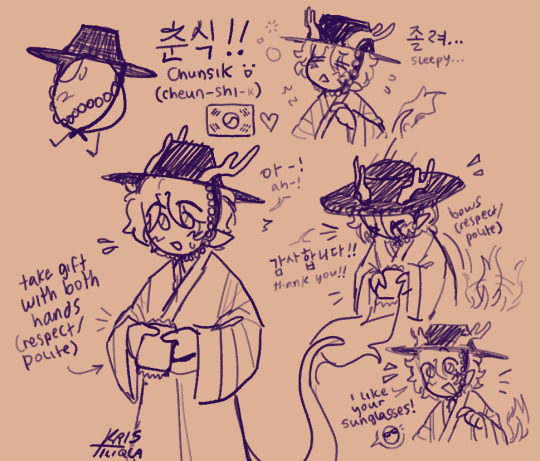
CHUNSIK MY BELOVEDDDDDD
#im korean american and BRO#when i tell you that i was so fucking excited and happy#i actually cried bc i got emotional thinking about it all 😭#the language i hear everyday being shown to an international audience n shit :((( waaaahhh its so cool man#my culture as well :(( i was so fuckin happy (i shared so much random korean shit on my twt LOL)#i died when q said he had a surprise for acau and mentioned the eggs bro#like holy shit YES A KOREAN EGG 😭😭😭 ITS ALL I’VE EVER WANTED BRO#I USED TO PRAY 😭😭😭#i love chunsik sm he’s such a polite lil gentleman :(((#he dug tina n her horse out when she fell in a hole …#placed blocks when she missed a jump to a ladder …#and opened a fucking door for her 😭😭 he’s such a sweetheart#i love him sm u actually dont understand#anyway normal tags now LOL#qsmp#qsmp fanart#qsmp chunsik#chunsik fanart#chunsik the egg#qsmp korea#he is my everything 😭🫶#my art
619 notes
·
View notes
Text

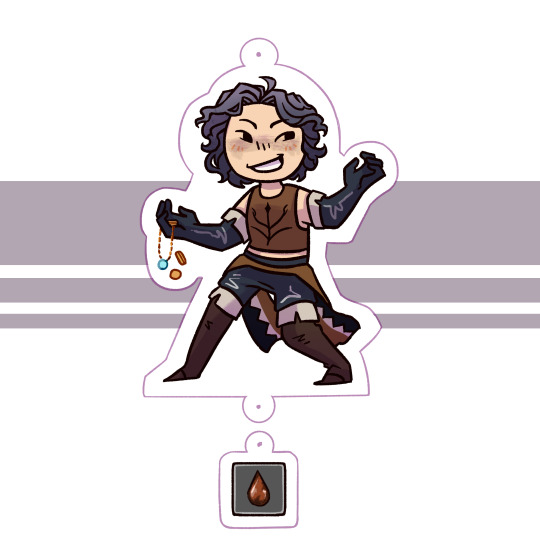
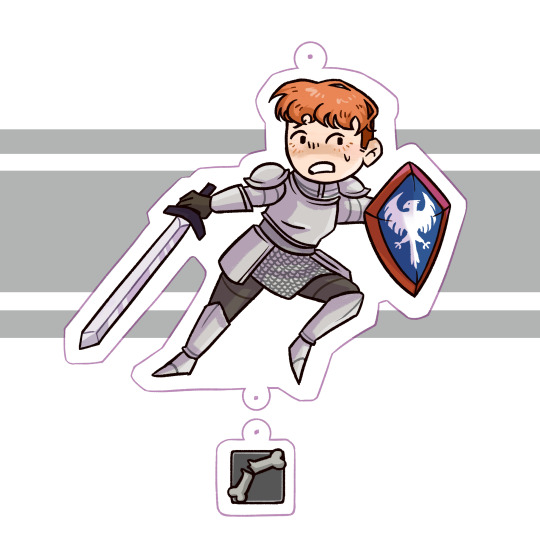
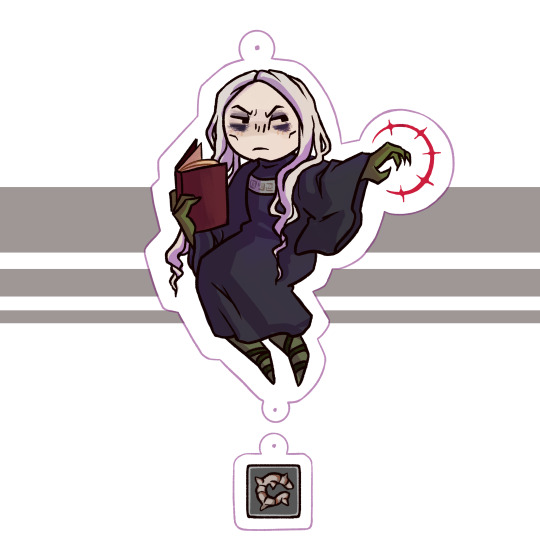

The strugglersss
#my art#funger#fear and hunger#cahara#d'arce cataliss#enki ankarian#ragnvaldr#man i love doing mockup fake charms and such its so fun#my sideblog followers already know from my doodles that ive been playing funger for the past month#but now im inflicting the horror crew onto main blog as well sorry#man what a good game no other caused me such primal fear of 'not wanting to be there' like funger does im sooo normal about it trust me#but heads up to those who dont know it is a very dark game with a lot of fucked up stuff you have been warned
224 notes
·
View notes
Text

home
#legend of zelda#tears of the kingdom#totk spoilers#zelink#spoilers in tags beyond this point#im so normal about them (lying) i cant even rmb the last time a series that wasnt my current hyperfix made me want to draw smth#i keep thinking about the ending scene and going 😦 ..>??!???!/ 384789wuri4ty#i just realized the hand he reached out to her with is the hand he just got back . for the first time in the game. fuck man#also im sure her saying im home is just a translation of tadaima but it hits different in english when u consider that like#shes been home this entire time... just not in the right Time.... its like..... shes only home when link is there....#(fucked up)
1K notes
·
View notes
Text
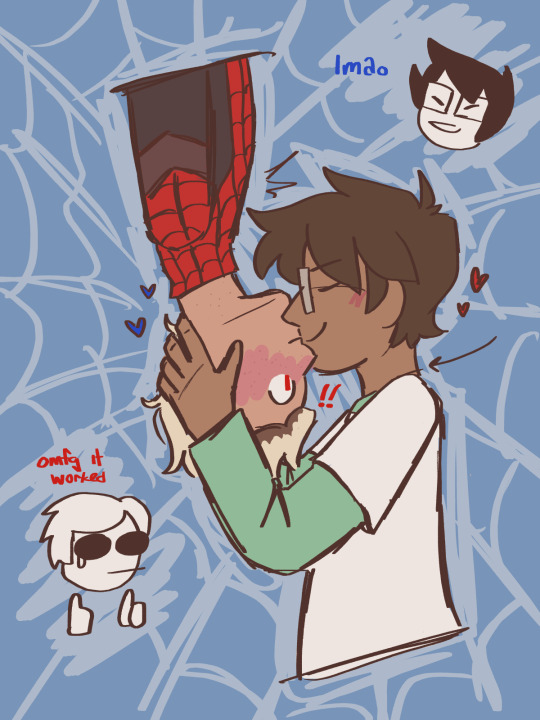
strider-man... haha. im hilarious (johndave week day 5 - first kiss) alt under cut

#I LOVE JOHNDAVE#AND I LOVE SPIDERMAN#RAHHHH#im normal about them#johndave#davejohn#pepsicola#hammertime#johndaveweek2024#i fucking love them#john egbert#dave strider#homestuck#homestuck fanart#ill admit strider-man was not my idea i was looking up designs to get some inspo and thought that was funny as hell#anywho#loyal tag readers i dont have that much content for you today. BUT#the thought behind this is that like#dave kind of dropped down in front of john like “hey”#in the middle of his rounds#and they chatted#and then he goes leave to leave like “what no kiss goodbye” as a joke#guys it wasnt a joke#neither of them are about to back down from a dare#he definitely fucking absconded afterward though#i fucking love them.#oh my god.#this is probably my favorite post ive ever made actually#im so proud of this
179 notes
·
View notes
Text

Does it ever hit you like a fucking truck just how beautiful and gorgeous he is?
#GOD IM ON MY FUCKING KNEES MAN#aksjejxnekxwje#i am so normal about him#101 suo expressions#101 suou expressions#suo hayato#suou hayato#wind breaker#wind breaker nii satoru
185 notes
·
View notes
Text
consider: darker take on muzzled fell sans. where fell monsters (or at least some of them) are forced to wear muzzles for whatever reason. and you gently take red's off him.... in a sweet tender moment..... just the two of you.... and you smooth your fingers over his cheek, tracing the lines dug into his bones from the restraints........ and he leans into your hold... maybe even turns and presses a skeleton kiss into your palm......
#im so fucking normal about this man#muzzled fell sans#mono's simping again#mono's simping so fucking hard#fell sans my beloved#i wish to gently hold the big bad skele
52 notes
·
View notes
Text

Borderlands fans - I am giving you a small gift because I wanted to draw this man and thought this would be a good time to use my 1000 screenshots of him fhsahioasf. So - here is Rhys' head from TFTBL from different angles.
I wanted to make Jack one but unfortunately in Tales, that guy looks mostly straight so it didn't work out. So, instead, have some compilations of my screenshot of Rhys' expressions I liked while looking through all these ihfofsahios
Enjoy <3



#art reference#tales from the borderlands#TFTBL#Rhys#Rhys Strongfork#Rhys the company man#expressions#reference#screenshots#Im so normal about this man. For fucking real. I get Katagawa jr
164 notes
·
View notes
Text
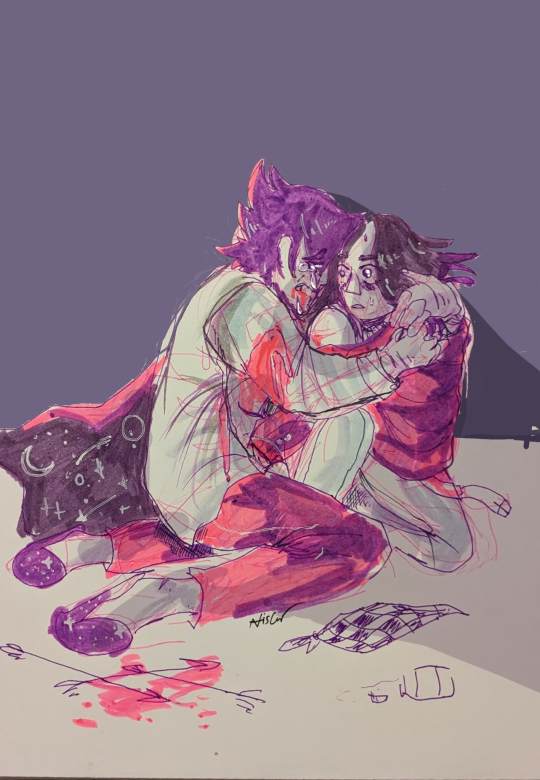
A moment of vulnerability
#danganronpa#my art#art#avis's doodles#drv3#kokichi ouma#kaito momota#kokichi oma#oumota#danganronpa killing harmony#idk man they fuck me up#kaitos grieving for himself and kokichi and maki.#and kokichi doesn't want that. he doesnt want this moment of pain because it makes the whole thing so much more painful#it was easier when Kaito hated him#and kaito is so earnest and the poison is getting to him and-#so yeah im normal about chapter 5#I can't draw size differences
242 notes
·
View notes
Text
the way to the moon is about holding on (to the promise you don't even remember making, to the person you loved, to the life you never got to live but refuse to give up). it's johnny choosing to be with river time and time again, it's johnny holding on to all the paper rabbits river made even if he didn't know their significance, it's river keep trying to remind johnny of their shared past, it's river giving up her treatment so a place that means the world to her is protected, it's eva and neil trying their hardest to send johnny to the moon, it's eva taking the risk in hopes of making it
the way finding paradise is about letting go (of your mistakes, of the unrealistically perfect life you never lived, of the person who helped you through your darkest times but who now keeps you stuck in the past). it's colin letting go of faye despite being afraid, it's colin keep replacing pages in his book with new ones, it's faye knowing that colin never needed sigmund's help, it's faye telling colin he has to let go of her if he wants to live fully, it's neil and eva trusting faye despite what it means for them, it's neil taking the risk in hopes of making it
#IM SO NORMAL ABOUT THEMMMMMMM#god#please#sobbing#THEM#what is impostor factory about?? great question#i need to play it at least 5 more times before i figure thag out#but i think#it's about choices in a way#i think it's in between letting go and holding on#it's all the different lives you could have lived if you chose something else#about the realities elsewhere#and how despite everything. all of them are still you#it's how different choices affect everything. from yourself to others#how ultimately you made a decision. this is your reality#but maybe somewhere else there was a chance for a different life#idk man im rambling#I LOVE THEM TO DEATH U DONT UNDEDSTAND#to the moon#finding paradise#freebird games#eva rosalene#neil watts#colin reeds#river wyles#faye#sigmund corp#i keep writing johnnys fucking name wrong save md#gamer hours#johnny wyles
172 notes
·
View notes
Text
On ad astra per aspera ✨
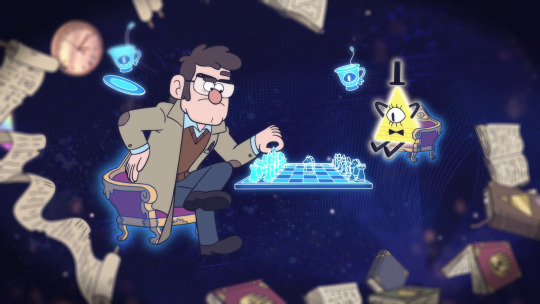
Can we talk about the repeated use of ad astra per aspera? Cause uhhhh it shows up twice, once on the website and once in the Book of Bill, and OH BOY this has connotations, both for Bill and Ford's relation in the literal and figurative meaning on the word, and for Bill's own history:
(extra addition added 16/09/2024! 🌝 )
First, in the website (if I recall correctly) if the phrase ad astra per aspera is inputted into the computer, you get the two pages on Bill's 'funeral':
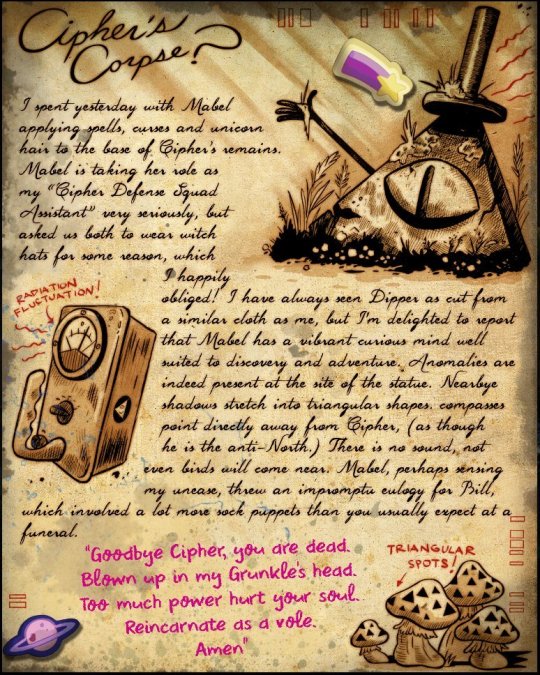

And within, in the pages, at the very end before signing there names is the phrase itself (highlighted in red) .
Secondly, a joke version of it is seen in the Book Of Bill, specifically on the night where Bill and Ford fucked 'one thing led to another':
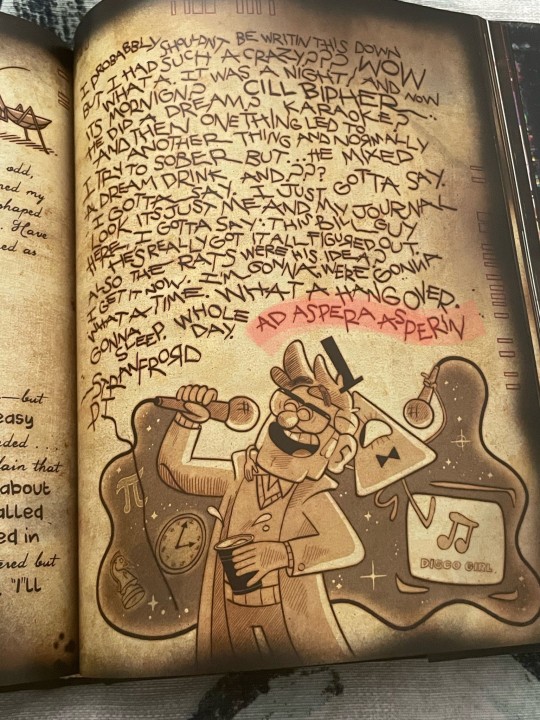
In this one, it's clearly a joke off of aspirin used for his hangover, used again to close the entry.
Now the phrase ad astra per aspera itself means 'through suffering to the stars', which also has... wider connotations then just these two piece alone, which I'll unpack later. But first, the interesting choice of connection of these two pieces;
Both times the phrases occur, they occur closing the entry; a bit too much of a coincidence to me (and in this fandom there is no such thing as a coincidence). Considering that the 'one thing led to another' night is a night that was important to their relationship as it hints at the intimacy they had with each other, it showing up again in Ford's 'funeral' entry about Bill feels very much like an allusion to that night. Especially considering in the funeral entry Ford is very open about how much he cared about Bill, with how he at one point "considered him the centre of his life". The entry from Ford reads as someone who is moving on, and part of this is acknowledgement of the grief and sadness for the more positive part of the abusive relationship that he lost. As a result, having him acknowledge the intimacy of their relationship, it makes sense for him to tongue in cheek allude back to his first writing down of the phrase, where they were quite clearly implied to fuck be intimate.
While it alludes to their Bill and Ford's intimacy, the literal and metaphorical meaning of the phrase also rings true here; through suffering to the stars. If we talk literally, then through Ford's relationship with Bill, something that ultimately was full of suffering, he built the portal, and ended up wandering the myriad worlds out there in space; one may say out there among the stars. He literally was out there wandering the stars as a result of suffering.
Now metaphorically, the phrase means through suffering/adversity one gains beautiful/worthwhile things. Considering this entry is Ford moving on from Bill, this is very apt; again, their relationship caused Ford immense suffering, and as he is now letting that relationship and suffering go, he's instead prioritizing creating healthy relationships with Stanley, the other twins and Fiddleford (the something beautiful and worthwhile part!). In fact, the entry on Bill's funeral is half on him strengthening his relationship with Mabel, the shooting star, another layer of wordplay; case in point about the healthy relationships. He's weathered through his abusive relationship, to discover and create a loving family.
It doesn't quite end there however; although that's fairly it for specifically Ford and Bill's relationship, we also haven't talked about what the stars mean to Bill himself. Which, well; it's very clearly implied that Bill accidentally killed everyone in his dimension in an attempt to show his parents (and other people in his dimension) the stars. And on top of that, to quote; "I looked up and saw the stars. And I was ready to become one of them". Which he then in a way, becomes, considering the page in journal 3 on constellations, in which Ford remarks that one of his favourite constellations is the constellation 'William' (obviously Bill). It's a bittersweet immortalization of himself after everything that occurs around trying to see the stars for Bill.
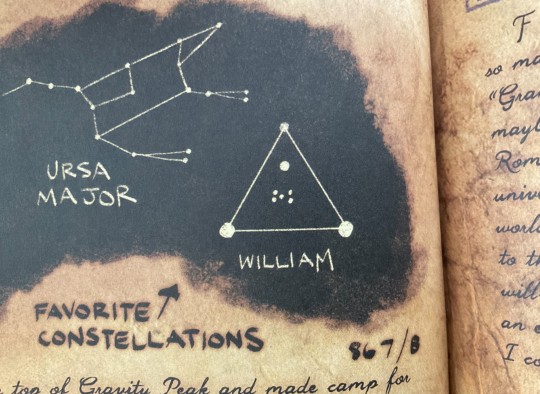
So I find it very interesting that for Ford, a phrase about suffering and stars is something he ends up correlating to his relationship with Bill, considering that to Bill, to get to the stars is something he deeply suffered for as a result. It's also important to note that Bill's suffering was something that occurred out of love, and ultimately an attempt to be understood and create a deeper relationship with his parents where they could trust him. And then for Ford, all this while later, to look up to the stars (to see them) and to see the Bill constellation and go 'oh that's one of my favourites' is fulfillment. Because Ford during that time trusted and cared deeply for Bill, fulfilling that relationship of trust, love and understanding(at least surface level, considering the way they banter together), that Bill had yearned for when he was younger and killed his plane.
So all in all(tldr): ad aspera per astra, (through suffering the stars), is quite the fun phrase to unpack in regards to Bill and Ford's relationship, considering the deliberate reference to the phrase on the entry about the night 'where one thing led to another' and Bill's funeral entry. The phrase is a combination of references; tongue in cheek allusion to the intimacy, but also references to the literal (space fugitive) and figurative (abusive relationship, to loving family again pipeline) hardships Ford endured as a result of the relationship. There is also irony in the way that Ford seems to correlate this phrase about suffering and stars with Bill and his relationship, considering that out of an effort to be understood and share the stars with his parents, Bill accidentally killed his whole dimension; later he also made a constellation of himself. As well, as Ford says that one of his favourite constellations is a constellation that's clearly Bill in Journal 3, it alludes to that Bill's wish to show his parents the stars and be recognized is fulfilled by Ford (pre-portal incident that is).
EDIT: extra details added on the constellation piece as of Aug 14 2024 (less than 24 hours after og posting, because I'm deranged). Big thanks to @bowl-o-nudel for the nudge :)
Edit (16/09/2024): I've had a few people say that the saying has appeared in Journal 3 multiple times, and having reread journal 3, to my delight it is indeed correct! And oh the CONTEXT they give. The two instances are those seem below; the first appearance in the title page of Journal 3, and second time is a page from when the twins graduate.

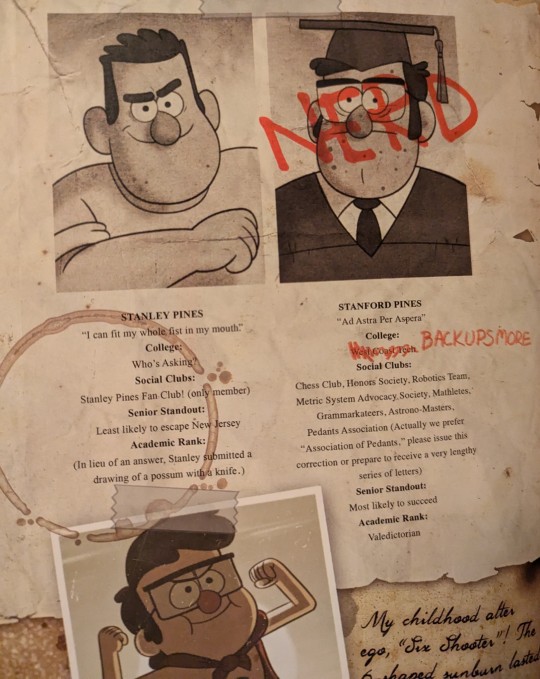
As well as all the parallels of how the phrase is applied for both Bill and Ford, as @zoizyboigy suggested, it seems to be a phrase that Ford takes as his own motto. It seems to be a highly personal motto to him; after all, they all are written around important turning moments in Ford's life; graduating, the journals which where to be his ticket to fame, fucking a triangle finding acceptance and intimacy with Bill , and lastly, moving on in his life from Bill and his destructive obsession with recognition.
And it makes sense WHY this motto is one that is highly personal to Ford; the first time it is seen chronologically is when he's graduating, chosen when he believes he's going to be accepted into the university. It's a motto he chose because he was excited, because he thought he was already through his suffering and arriving to the stars of his fancy university, where validation and acceptance would abound; only that doesn't happen, and the suffering part within the motto is the only thing that's accurate, especially as that's when he rejects Stan. It's a motto chosen in celebration, that becomes a reminder of the failure to become someone who is accepted and important (and his prioritization of validation over relationships); it's now something he holds that reminds him of the validation he believes he deserves and he obsessively chases.
And that's why you see it in the journal pages, because these journals are going to change his life, he's going to become finally a person of importance and be accepted with the information he's compiled in the journals. And in the same way, you see it after Bill (and interdimensional being of ancient knowledge) and him are intimate; he's become someone of importance to Bill, he's been accepted by Bill, even attractive to Bill (romance Ford seems to have terrible luck in).
And that's why you see it at the end of Ford's farewell to Bill; it's another turning point, it's Ford letting his obsession with world validation go which characterized it's meaning from the beginning, Ford letting go of his relationship with Bill, which it also came to mean, and instead celebrates his acceptance within his family and the strengthening of those bonds, and of prioritizing healthy, loving relationships.
Ps, if you enjoyed this meta post, I've also made another one, on exceptionalism!
#gravity falls#the book of bill#bill cipher#stanford pines#gravity falls stanford#ford pines#meta analysis#hugin rambles#billford#journal 3#im soooo normal about them#like fuck man bill you fumbled him so hard after finally experiencing a fufilling relationship? damn#a wee edit whoops#thisisnotawebsitedotcom#hugin rambles gf
608 notes
·
View notes